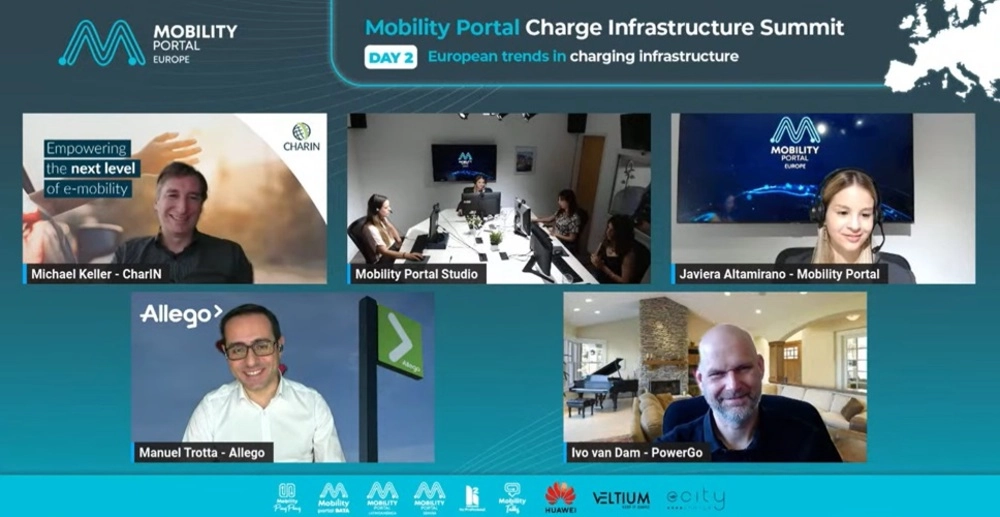During the “European Trends in Charging Infrastructure” event, organized by Mobility Portal Europe, industry leaders shared their opinions on the Alternative Fuels Infrastructure Regulation (AFIR).
In the first panel, titled “Recharge infrastructure essential to achieve AFIR targets,” panelists unanimously emphasized the urgent need for this regulation to facilitate the eMobility transition.

Michael Keller, Executive Board member at CharIN, asserts that, for the time being, the regulation is appropriate.
However, looking ahead, it will be essential to take more actions than “simply installing a high-power charging (HPC) station every 60 kilometers.”
“Considering the anticipated increase in eVehicle travel, it will also be necessary to expand the charging network’s capacities to meet the demand,” he explains.
Simultaneously, there is a need to promote not only the development of EVs but also to encourage consumers to acquire these automobiles.
This aspect is not fully reflected in the AFIR.
“I strongly support the regulation, although I believe it constitutes only the first step in achieving the goals set within the ‘Fit for 55’ framework,” he emphasizes.
It is estimated that by 2030, 65 million electric vehicles will be on the roads in Europe, a number expected to rise to a total of 130 million by 2035.
In this context, it is necessary for the expansion of the charging infrastructure to accompany the market’s growth.
It is also crucial to prepare the electrical infrastructure to face this transition towards sustainable mobility, as the urban distribution network could experience an uncontrollable burden.
This potential scenario could potentially lead to variations in electrical voltage and, in extreme cases, compromise the quality of the electrical supply.
Some studies demonstrate that the European electrical grid is prepared to meet the demand generated by electric vehicles.
Nevertheless, concerns persist among various industry stakeholders, and it is anticipated that preventive measures will be taken to avoid potential electrical overloads.
“It is necessary to implement measures that raise awareness among all member states, as well as those responsible for crafting regulations,” notes Keller.
All of this is aimed at preparing both the energy infrastructure and the corresponding network, particularly in regions where it is crucial to expand the network to deliver power to urban areas and highways, as is the case in rural areas.
A solution proposed by CharIN to address this issue involves integrating smart charging in locations where vehicles remain charged for extended periods, such as during working hours.
This initiative can not only benefit the network but also the entire energy system, simultaneously harnessing renewable energy sources.
“There is much more to come, and more aspects we must address to truly ensure the success of AFIR,” emphasizes Keller.
Meanwhile, he asserts that collaboration is the key to achieving goals, allowing each company, through its innovation and differentiation, to contribute to business growth.
“It is essential to establish a common ground for shared technologies, uniform standards, and protocols to create a level playing field,” he stresses.

In alignment with CharIn’s Executive Board, Ivo van Dam, CTO of PowerGo, shares his perspective.
“We must consider the power we offer and assess the load this imposes on the grids, as well as seek solutions to address this challenge,” he comments.
Hence, he suggests incorporating smart charging at charging points.
Moreover, he advocates for driving innovation and technology towards strategic locations where energy can be optimally harnessed at the right time.
Each CPO must be innovative and ensure that technology stays at the forefront, avoiding falling behind.
“Although I believe we are moving in the right direction, we should strive to do better,” he points out.

The third speaker is Manuel Trotta, Product Manager Charging & Payment Solutions at Allego.
Similarly to Keller, Trotta acknowledges,”I agree that we need more than one charging point every 60 kilometers, and I consider the AFIR to be just the beginning of this transition.”
Especially considering that network congestion represents the primary obstacle.
As a complement to the solutions previously mentioned by other speakers, Trotta proposes the implementation of off-grid battery storage for charging electric vehicles.
The goal is to make the journey easy, feasible, convenient, and reliable for EV drivers.
“Our drivers are at the core, and all initiatives related to scalable charging infrastructure, innovation, and obstacle removal are designed to simplify their lives,” he concludes.
Next, the participation of Keller, van Dam, and Trotta in the Mobility Portal Charge Infrastructure Summit:








